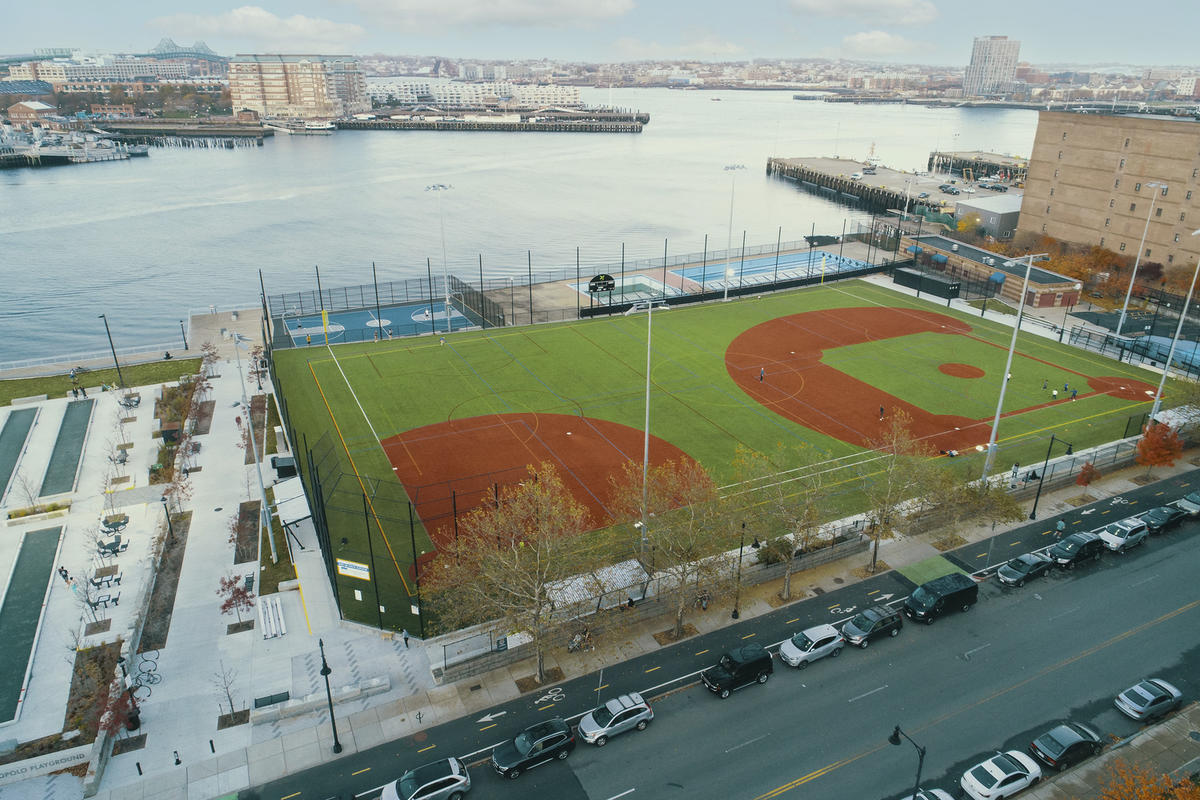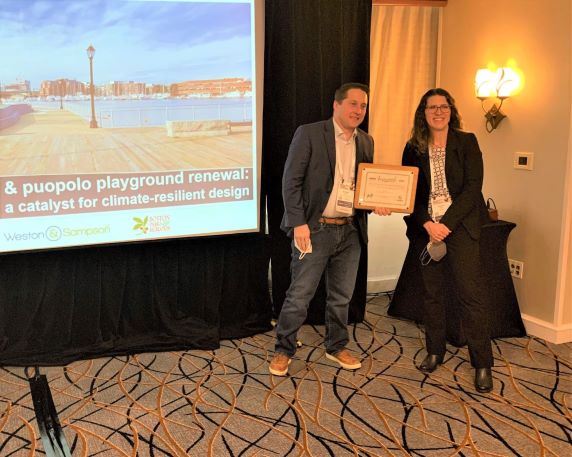Langone Park/Puopolo Playground Project Wins 2021 Green Steps Award
Climate resilient improvements to the park protect the entire neighborhood from sea level rise and flooding while providing water access and views for all.
On Monday, January 24, the Boston Parks and Recreation Department was pleased to accept the 2021 Green Steps Award from the New England Water Environment Association (NEWEA) for climate-resilient improvements to the Langone Park and Puopolo Playground on the waterfront in the North End. The Green Steps Award celebrates achievements in innovation and sustainability within the wastewater and stormwater industry that demonstrate initiative and leadership in the implementation of innovative, sustainable practices.
NEWEA noted that they are “excited to award the City of Boston with this year’s Green Steps Award. This is exactly the type of integrated project that we look for—one that provides multiple benefits to the community, incorporates innovative and sustainable strategies, involves a high degree of public outreach and education, and demonstrates sincere collaboration between the stakeholders and the project team. We couldn’t be more pleased for all involved.”
Langone Park and Puopolo Playground has a storied history as one of the city’s oldest parks and, most notably, as the site of the Great Molasses Flood of 1919. Established as a city park in 1893, the area was inundated by flooding in March 2018 due to sea level rise after a nor’easter storm event where high tides breached the park's seawalls and many other areas throughout Boston’s downtown. The storm caused the third highest tide recorded in city history, with a crest of nearly four feet above the shallowest elevations of the park. This storm event, taken in combination with a similar storm that occurred only two months prior, pushed climate resilience to the forefront within the confines of City Hall.
With the City's backing, the design team quickly pivoted from any initial design plans and pushed forward a new design approach, one that adapted to climate change and incorporated coastal resilience strategies. This new approach put newly adopted resilient design standards into practice for the first time at a Boston park or open space property and serves as a pilot project for others to follow. With the recent completion of the Boston Public Works Department’s Climate Resilient Design Standards and Guidelines for Protection of Public Rights of Way, the City was ready and committed to leveraging its waterfront parks and recreational assets in ways that were never considered before to protect its neighborhoods and communities from sea level rise and future storm events.
With an interdisciplinary, collaborative design approach, the project team evaluated thoughtful solutions quickly and efficiently that could adapt to and address the challenges of climate change, including "king tides," incremental sea level rise, increased storm events and intensities, urban heat island effects, and the inundation of existing and aging infrastructures.
The final design solutions reflect an innovative combination of climate mitigation and flood protection considerations with high design value for recreational facilities. From adding a multifunctional, stepped secondary seawall that improves protection from damaging storms and provides seating, to raising important park amenities, to cantilevering the Harborwalk path over the water on stabilized micropiles (deep-drilled foundation elements with a significant capacity for depth and support), to including LED lighting with raised utilities at high points onsite to maintain electrical resilience during flooding events. Every element is designed both for functionality and resiliency now and in 50 years. The design serves the needs of the community while blocking anticipated flood paths that could cause extensive damage to the park and surrounding neighborhood.
The project involved extensive stakeholder inclusion, public participation, and community outreach. The team held numerous public meetings from October 2017 through May 2018 to outline project goals, timelines, and potential challenges; promote anticipated project benefits; solicit community feedback; and listen to concerns from the public. These efforts also involved producing educational signage displayed onsite for the benefit of all who visit.
“The Boston Parks and Recreation Department was pleased to work with such a talented team on Langone Park and Puopolo Playground,” noted Cathy Baker-Eclipse, Director of the Capital Plan for the Boston Parks and Recreation Department. “This project creates a blueprint not only for how we tackle the issue of climate resilience going forward but also in the ways we can bring together a coalition of like-minded experts and agencies to ensure the sustainability of our city and facilities for the use and enjoyment of future generations.”
The project team was led by engineers, scientists, landscape architects, and others from Weston & Sampson of Reading and included other City departments such as the Boston Environment Department and Climate Ready Boston, the Boston Planning & Development Authority, and the Public Facilities Department. The Massachusetts Department of Conservation and Recreation played a lead regulatory role, and the team was ably supported by groups such as the Woods Hole Group, Boston Centers for Youth & Families, the Eliot School, Boston Harbor Now, Friends of the Boston Harborwalk, and others.
“Weston & Sampson is very proud to have worked with such a talented group of people, both with the City and the rest of our team,” stated Weston & Sampson’s project manager Brandon Kunkel. “We view this award as a reflection of that hard work and we are also very proud that the Langone Park and Puopolo Playground will serve as a safe, climate resilient public facility for many decades to come.”
BENEFITS TO THE ENVIRONMENT
The Langone Park and Puopolo Playground project was the first in the city designed with climate resilient features embedded throughout to protect the park’s shoreline, the neighborhood, and other public assets from projected sea level rise and an increase in storm events. While the traditional lifespan of a substantial park improvement project like this is approximately 30 years (i.e. 2050) and the 1% storm event criteria, the solutions for climate change put in place today allow for future expansion through the year 2070 storm events.
The project involved an interdisciplinary approach that reflected a confluence of ideas from resiliency professionals, engineering experts, and award-winning designers. The project team incorporated a blend of proven engineering, design techniques, and best practices with innovative strategies and resilient materials to accommodate the plans for a revitalized park that would attract multigenerational users, including neighborhood residents, tourists, and international visitors. In addition to the obvious environmental sustainability realized with the implementation of resilient site protection and recovery, the project realized the social benefit of drawing people to the water and bringing a community together. Many complaints about commercial growth in urban coastal communities are related to the lack of access to the water for all; with the Harborwalk connection and the secondary seawall with its integrated bleacher style seating, the park design provides water access and views for anyone who wants it.
With easy access to the North End, Rose F. Kennedy Greenway, New England Aquarium, Faneuil Hall, and the greater city, this accessible, resilient waterfront park will encourage visitors with its dramatic water views and multiple opportunities for active and passive recreation. The increase in visitors to the area will inevitably improve economic sustainability and increase retail and commercial revenue, drawing people to the area, to the water, and to restaurants, stores, and vendors.
Langone Park and Puopolo Playground was also designed to withstand and recover from climate-related events and protect surrounding areas from flooding through the park; the design does not just divert water through the park and into other areas offsite. The resilient, adaptive design strategies implemented include constructing the secondary seawall, elevating facilities within the park, and installing amenities that serve community needs while mitigating anticipated flood paths within the park that could cause extensive future damage to site assets and surrounding areas.
Most importantly, it acts as a proof-of-concept for other sites along Boston’s waterfront and serves as an example of sustainable development that follows Boston’s Climate Resilient Design Standards & Guidelines for Protection of Public Rights-of-Way.



